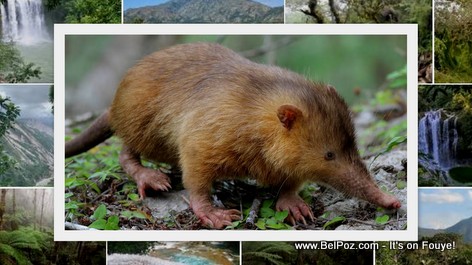The Hispaniolan Solenodon (Nen Long in Creole), a species going extinct in the Pic Macaya Region of Haiti

The Hispaniolan Solenodon, Called Nen Long in Haitian Creole
With its distinctive appearance and remarkable survival story, this small mammal offers a glimpse into the unique biodiversity of the Caribbean region and the importance of conservation efforts.
If you happen to live near Pic Macaya and you have seen this animal, tell us of you know any other local name for it.
The Solenodon's Unique Features:
The Hispaniolan Solenodon (Solenodon paradoxus) or Nen Long is a nocturnal, insectivorous mammal with some rather extraordinary traits.
One of its most notable features is the venomous saliva it uses to immobilize its prey, which includes insects, worms, and small vertebrates.
The venomous bite, reminiscent of a snake's, serves both for hunting and defense. This adaptation is a testament to the Solenodon's exceptional evolutionary history.
A Living Fossil:
Believed to have existed for over 76 million years, the Solenodon is often referred to as a "living fossil." It's one of the few remaining members of an ancient lineage that once thrived across the continents.
The species has survived numerous environmental changes, including the mass extinction events that wiped out the Dinosaurs.
Nen Long lived in the Pic Macaya Region:
The Solenodon's habitat is predominantly the Caribbean island of Hispaniola, which includes Haiti and the Dominican Republic. Within Haiti, the Pic Macaya National Park stands out as a crucial stronghold for this elusive creature.
The park, a UNESCO Biosphere Reserve, is known for its diverse range of flora and fauna, including various species found nowhere else on Earth.
Conservation Challenges:
Despite its impressive resilience, the Hispaniolan Solenodon faces significant conservation challenges. Habitat loss due to human activities, such as deforestation and agriculture, has led to a decline in suitable living spaces.
The Solenodon's limited population size and slow reproduction rate make it particularly vulnerable to these threats.
Conservation Efforts:
Efforts to protect the Hispaniolan Solenodon and its habitat are essential for the species' survival.
Organizations, researchers, and local communities are working collaboratively to raise awareness about the importance of preserving the Pic Macaya region's unique biodiversity.
Conservation initiatives include reforestation projects, habitat restoration, and educational campaigns to engage both locals and visitors.
You might also like
- Should COVID-19 reach the general population in Haiti the spread will be massive, 2 reasons why
- Haitians simply refuse to loose the habit of cooking with "Chabon"
- Climate change is a very big terror in Haiti and Haiti is not responsible, environment minister said
Hot Haiti Topics
Haiti Photo Stories
New Haiti Topics
Leave a Reply
Name (required) E-mail (required, will not be published)
» »

 Calling Rates Haiti Now 5 Cents More Per Minute: How Often Will You Call?
Calling Rates Haiti Now 5 Cents More Per Minute: How Often Will You Call?  How many generations to be considered of Haitian descent? How to know if...
How many generations to be considered of Haitian descent? How to know if...  List of Haitian NBA Players
List of Haitian NBA Players  PHOTO: Television National d'Haiti (TNH)
PHOTO: Television National d'Haiti (TNH)  Watermelon is like a Natural Viagra - Watermelon may offer Viagra-like...
Watermelon is like a Natural Viagra - Watermelon may offer Viagra-like...  Rospide Petion - Haitian Journalist
Rospide Petion - Haitian Journalist  Naomi Osaka at a 2019 Porsche Tennis Grand Prix Press Conference
Naomi Osaka at a 2019 Porsche Tennis Grand Prix Press Conference  PHOTO: Wyclef Jean in graduation Uniforms
PHOTO: Wyclef Jean in graduation Uniforms  The Hispaniolan Solenodon, Called Nen Long in Haitian Creole
The Hispaniolan Solenodon, Called Nen Long in Haitian Creole  PHOTO: Naomi Osaka and Michael B. Jordan
PHOTO: Naomi Osaka and Michael B. Jordan  2018 WTA Finals - Naomi Osaka vs Sloane Stephens
2018 WTA Finals - Naomi Osaka vs Sloane Stephens  PHOTO: Roody Roodboy and his mother
PHOTO: Roody Roodboy and his mother  Naomi Osaka and Coach Sascha Bajin
Naomi Osaka and Coach Sascha Bajin 
 When foreigners ask me how is Haiti doing, this is what I tell...
When foreigners ask me how is Haiti doing, this is what I tell...  List of Countries Haitians can Travel to without a Visa
List of Countries Haitians can Travel to without a Visa  Embracing Identity: Why some Haitian women retain their maiden...
Embracing Identity: Why some Haitian women retain their maiden...  Haiti Consumer ALERT: US rice exported to Haiti may be harmful...
Haiti Consumer ALERT: US rice exported to Haiti may be harmful...  Haitian Pastor who recommended 21 bed bugs as the cure for...
Haitian Pastor who recommended 21 bed bugs as the cure for...  Coincidences : Konpe Filo and Liliane Pierre-Paul born the...
Coincidences : Konpe Filo and Liliane Pierre-Paul born the...